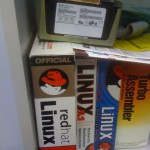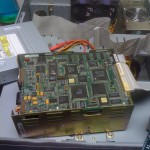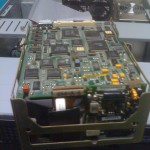December 5, 2009, 9:52 pm
To throw my .02$ into this fray I say:
Linux is for work and Windows is for play :)
But seriously I have been amazing at how many free tools Linux includes with the OS (or via the net/repos) for free.
Then there is the issue of the constantly evolving Windows “shell” which keeps changing commands almost every major release of the OS. With Linux I can run basically the same command,with little or no changes, that I ran almost 15 years ago when I started playing around the OS. If Windows did this I would have much more respect for them and their OS.
November 28, 2009, 4:18 pm
Just a few thoughts I had while battling the endless waves of canned meat I fight daily. Some of these are out of anger, some are out of frustration, and some are there just for fun. I will let you, the end user, determine which one is for what reason.
In no particular order:
- Get rid of free email providers.
- Make all new domains registered setup and understand SPF/DKIM or similar DNS based technology
- Make email cost more per box with reasonable limits. I mean seriously who needs 500 boxes for a company with 10 people. A little extra cost can go a long way.
- Tougher Laws on people that send UCE (Unsolicited commercial e-mail). A little can go a long way here as well.
- Make violators found guilty of sending UCE watch endless internet phenomenon based movies for weeks at a time. Think the “Dramatic Chipmunk” and all its variants for a week flowing into the spammers brain Clockwork Orange style.
- Make ISPs stop tell the truth when telling its customers what their spam filter policy really is. Mark it as spam and the person you think isnt going to find out might just know you marked their message about family holiday cheer as spam.
- Catch-All accounts need to go away.Their day ended almost back in the days of the ARPA net. If we can end spam maybe these will be ok but till then its not a good idea, ever.
- Vacation/Away messages. You just told a spammer that not only is the mail box they are sending real but that the person there loves and misses them and will be back in a week.
(more soon real work calls)
November 28, 2009, 11:34 am

From a single “badmail” folder on a Windows Server 2003 box. Amazing how bad script writiers are as almost all of these were related to no “From” being set in the script.
November 28, 2009, 10:48 am
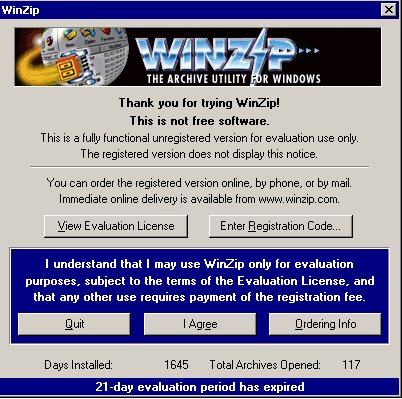
This Winzip install is on the same fragged Server 2000 box in the last post. This screen shot was taken Jan 7th 2007 but sadly I cannot get a new shot as a overzealous engineer uninstalled winzip last week for some strange reason.
November 28, 2009, 10:37 am
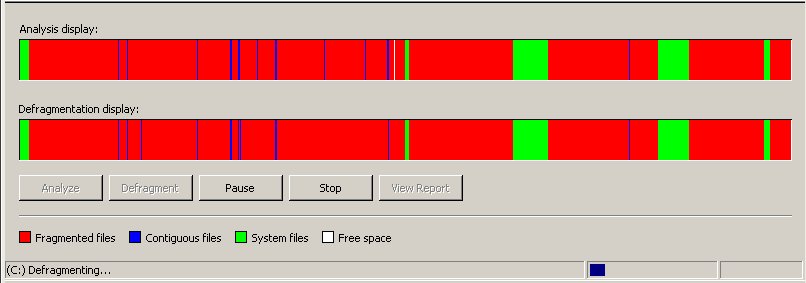
What do you think ?
This was a VERY old Server 2000 install that had been forgotten about. Seems time wasnt nice to the filesystem…or maybe the Sysadmin was a sadistic BOFH who is into filesystem S&M ?!
November 20, 2009, 4:57 pm
While doing some spring cleaning I came across a old Seagate ST43400N 3G 50 Pin SCSI drive and decided I would go back to my roots and benchmark this monster so I could compare it with the Dell system in a previous post.
Well after a full run with the same sysbench test below I got …a whopping …. 5MB per second ! Compared with the test I ran below its very apparent that technology moves on and drives like these become novelties very quickly.
November 17, 2009, 5:17 pm
I got the chance to finally do some benchmarking on the new X5550 Xeons. Here is what I came up with using sysbench.
System:
CPU:2x X5550 Xeons (8 cores)
RAM: 16G
Hardware Vendor (Model): Dell (R510)
OS: CentOS release 5.4 (Final)
Kernel : 2.6.18-164.6.1.el5 x86_64
HardDrive(s): OS - Raid 1 / /var/lib/mysql Raid10
Harddrive Controller: Perc6
my.cnf
innodb_log_group_home_dir=/var/log/innodb_logs
innodb_log_file_size=256M
innodb_log_files_in_group=2
innodb_buffer_pool_size=6G
innodb_additional_mem_pool_size=60M
innodb_log_buffer_size=4M
innodb_thread_concurrency=0 #As of MYSQL 5.0.19 0 makes this unlimited
innodb_file_per_table=1
innodb_flush_log_at_trx_commit=2 #Risky but not a worry for this customer due to mainly static data.
Sysbench Command :
sysbench --test=oltp --db-driver=mysql --num-threads=16
--mysql-user=root --max-time=60 --max-requests=0 --oltp-read-only=on
Test Result (subsequent tests were withing a small percentage of this resulte)
OLTP test statistics:
queries performed:
read: 4457866
write: 0
other: 636838
total: 5094704
transactions: 318419 (5306.75 per sec.)
deadlocks: 0 (0.00 per sec.)
read/write requests: 4457866 (74294.56 per sec.)
other operations: 636838 (10613.51 per sec.)
Test execution summary:
total time: 60.0026s
total number of events: 318419
total time taken by event execution: 958.0739
per-request statistics:
min: 0.98ms
avg: 3.01ms
max: 334.80ms
approx. 95 percentile: 10.86ms
Threads fairness:
events (avg/stddev): 19901.1875/1010.54
execution time (avg/stddev): 59.8796/0.03
sysbench --test=fileio --max-time=60 --max-requests=1000000 --file-num=1 --file-extra-flags=direct --file-fsync-freq=0
--file-total-size=128M --file-test-mode=rndrd run
sysbench 0.4.10: multi-threaded system evaluation benchmark Running the test with following options: Number of threads: 1 Extra file open flags: 16384 1 files, 128Mb each 128Mb total file size Block size 16Kb Number of random requests for random IO: 1000000 Read/Write ratio for combined random IO test: 1.50 Calling fsync() at the end of test, Enabled. Using synchronous I/O mode Doing random read test Threads started! Time limit exceeded, exiting... Done.
Operations performed: 910652 Read, 0 Write, 0 Other = 910652 Total
Read 13.895Gb Written 0b Total transferred 13.895Gb (237.15Mb/sec)
15177.50 Requests/sec executed



